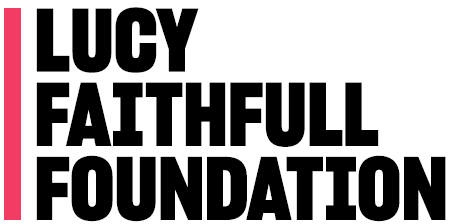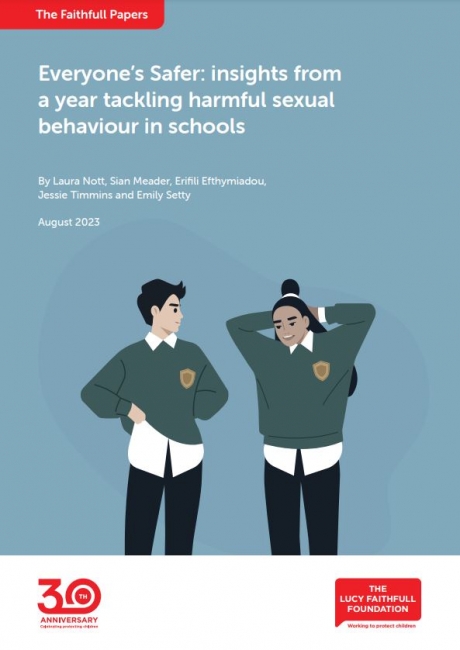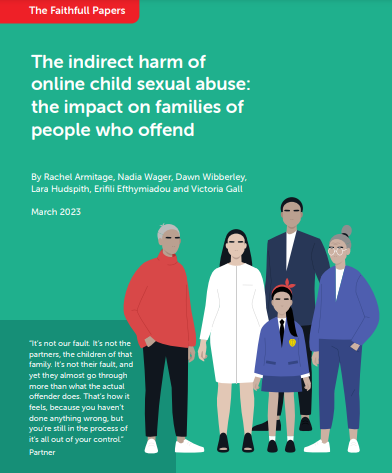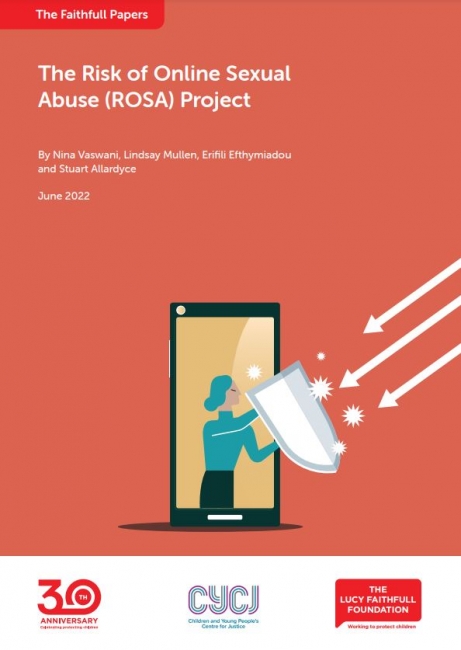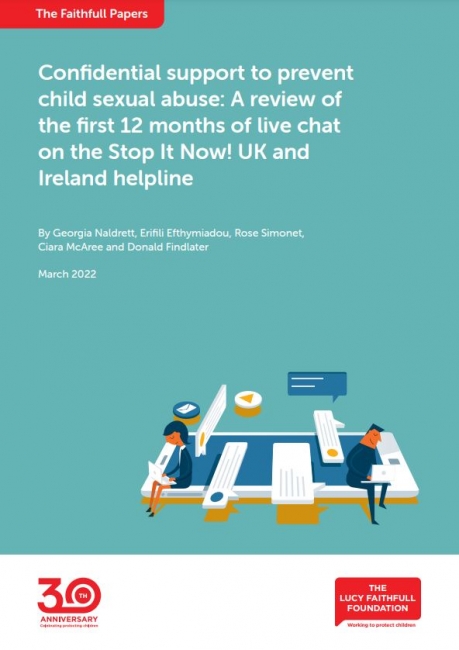The Faithfull Papers
Because the risks to children change, our response is always evolving. Practice-based insights and evaluation drive us to develop innovative services and pioneering interventions for wherever they are needed, online or offline.
Our Faithfull Papers are a series of reports showcasing our understanding of what works to protect children to the widest possible audience. By sharing insights and opportunities, we can achieve the best possible outcomes for children.
- Confidential support to prevent child sexual abuse: a review of the first 12 months of live chat on the Stop It Now UK and Ireland help (24 March 2022)
- Preventing harmful sexual behaviour: evaluating the Risk of Online Sexual Abuse (ROSA) Project (27 June 2022)
- The indirect harm of online child sexual abuse: the impact on families of people who offend (28 March 2023)
- Deterring online child sexual abuse and exploitation: lessons from seven years of campaigning) (31 March 2023)
- Everyone's Safer project (19 October 2023)
- Creating safer environments for children and young people: situational prevention of child sexual abuse (29 February 2024)
- The role of protective parenting assessments and interventions in the prevention of child sexual abuse (27 March 2024)
- What’s porn got to do with it? The link between viewing adult pornography and online sexual offending against children(30 May 2024)
- Chatbots and Warning Messages - Innovations in the Fight Against Online Child Sexual Abuse (12 September 2024)
Chatbots and Warning Messages - Innovations in the Fight Against Online Child Sexual Abuse
Working with people who might harm is one of our key objectives, as it helps to protect children by taking potential offenders away from their pathway and towards better choices.
The ninth in our series of Faithfull Papers looks at the chatbot which is both a deterrent and a resource. When someone attempts to search for illegal content, the chatbot intervenes, issuing a warning and providing information about the potential consequences of their actions. Crucially, it also guides these people towards our help and support to change their behaviour.
Read our blog post to find out more.
Download the Faithfull Paper.
Sign up to receive updates from us.

What's porn got to do with it? The link between viewing adult pornography and online sexual offending against children (30 May 2024)
Opinions about legal adult pornography are often polarised. Some people claim it is a self-centred activity that impairs sexuality with a partner and fosters unhealthy sexual attitudes. Others say it is a modern way of expressing sexuality.
But through our work, we hear a different side of the story. Every year, we speak to hundreds of men who tell us that legal adult pornography contributes to problems in their intimate and wider relationships, their social and work lives, and their view of themselves. Most significantly, we hear that legal adult pornography sometimes contributes to them viewing illegal sexual images of under-18s.
Read our blog post to find out more.
Download the Faithfull Paper.
Sign up to receive updates from us.

The role of protective parenting assessments and interventions in the prevention of child sexual abuse (27 March 2024)
The sexual abuse of children has a devastating impact on them and their families. To protect children, we must intervene with parents. At the Lucy Faithfull Foundation, one of our growing areas of work is in the delivery of assessments of ability to protect, and protective parenting interventions.
The seventh in our series of Faithfull Papers explores the role of protective parenting assessments in the prevention of child sexual abuse and outlines top tips for engaging with protective parents, helping families move forward to a safe and stable future.
Read our blog post to find out more.
Download the Faithfull Paper.
Sign up to receive updates from us.

>Creating safer environments for children and young people: situational prevention of child sexual abuse (29 February 2024)
Child sexual abuse is a rapidly growing issue in the UK with estimates showing that more than one in six children will be sexually abused before the age of 16. Preventing this is a challenge in the UK and globally and a solution requires tangible steps that are easy to implement and simple to understand.
The sixth in our series of Faithfull Papers looks at how situational prevention plays a key role in preventing child sexual abuse, how we all can identify risks in everyday situations, and take the necessary steps to keep children safe from harm.
Read our blog post to find out more.
Download the Faithfull Paper.
Sign up to receive updates from us.

Everyone's Safer project (19 October 2023)
In September 2021, the KPMG Foundation supported us with funding in collaboration with the University of Surrey to undertake a three-year action research project with four main goals:
- to support schools when a harmful sexual behaviour incident occurs and ensure all invovled are support well
- to ensure schools benefit from the experience of others
- to help statutory agencies understand key issues schools face so they can provide better support
- to share evidence from the project which can contribute to the body of knowledge around tacking and responding to harmful sexual behaviour
Read our blog post to find out more.
Download the Faithfull Paper.
Sign up to receive updates from us.
Deterring online child sexual abuse and exploitation: lessons from seven years of campaigning) (31 March 2023)
Online child sexual abuse is a huge and growing problem in the UK and around the world. The scale of the issue – estimates of hundreds of thousands of people in the UK posing a sexual threat to children – mean that law enforcement cannot be the only response and society needs to disrupt these crimes before they happen.
Since 2015 we have run a campaign to deter people from online child sexual abuse, by targeting them with messages that the behaviour is illegal, causes great harm, has huge consequences, and that there is anonymous help to stop. The campaign has reached millions and shown that some people will seek help to change their behaviour, when they know it’s available.
Read our blog post to find out more.
Download the Faithfull Paper.
Sign up to receive updates from us.
The indirect harm of online child sexual abuse: the impact on families of people who offend (28 March 2023)
We are delighted to publish the third in the series of our ‘Faithfull Papers’ all about the impact of our Family and Friends Forum. Launched in 2018, the forum is a space for family members and friends of people who have been viewing sexual images of children or sexually communicating with a child online.
The report is based on an evaluation led by Professor Rachel Armitage (University of Huddersfield) to better understand the experience of, and explore the impact on, the family and friends of people who have offended online. Professor Armitage’s evaluation analysed the effectiveness of the forum which is visited by around 40,000 people every year and nearly 2,200 people have posted on the forum.
Read our blog post to find out more.
Download the Faithfull Paper.
Sign up to receive updates from us.
Preventing harmful sexual behaviour: evaluating the Risk of Online Sexual Abuse (ROSA) Project (27 June 2022)
Around one-third of child sexual abuse is carried out by under-18s and online harm is a growing problem as young people’s use of technology has increased. To combat these issues, in 2018, we launched the ROSA Project.
Over three years, we worked with young people between the ages of 10-18 who had exhibited technology-assisted harmful sexual behaviour (TA-HSB) to find out about the background to their offending, how to help them not offend again, and how best to put this knowledge into prevention work more widely.
Read our blog post to find out more.
Download the Faithfull Paper summary of the research and the full independent evaluation.
Sign up to receive updates from us.
Confidential support to prevent child sexual abuse: A review of the first 12 months of live chat on the Stop It Now UK and Ireland helpline (24 March 2022)
We launched a live chat service in September 2020, so that people could get support in a way that suited them. We helped people through nearly 900 chats and found the service to be favoured by people aged 21 and younger and people who haven’t been arrested – key groups to reach with support.
Read our blog post to find out more.
Download the research article.
Sign up to receive updates from us.
Sign up for news & updates
Fill in our newsletter form hereTo support our work to protect children, donate today.
Donate today